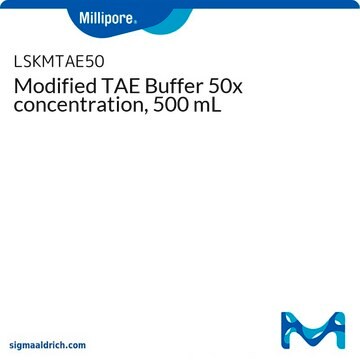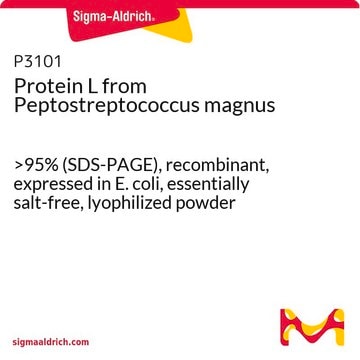T4038
Tris Acetate-EDTA buffer
BioReagent, DNase and RNase, none detected, suitable for electrophoresis, 10× concentrate
Synonyme(s) :
TAE buffer
About This Item
Produits recommandés
Gamme de produits
BioReagent
Forme
powder blend
Concentration
8.5-10.5 ×
Impuretés
DNase and RNase, none detected
pH
8.1-8.5
Solubilité
water: 64.2 g/L, clear, colorless
Adéquation
suitable for electrophoresis
suitable for gel electrophoresis (after dilution to working concentration)
Application(s)
diagnostic assay manufacturing
Chaîne SMILES
CC(O)=O.NC(CO)(CO)CO.OC(=O)CN(CCN(CC(O)=O)CC(O)=O)CC(O)=O
InChI
1S/C10H16N2O8.C4H11NO3.C2H4O2/c13-7(14)3-11(4-8(15)16)1-2-12(5-9(17)18)6-10(19)20;5-4(1-6,2-7)3-8;1-2(3)4/h1-6H2,(H,13,14)(H,15,16)(H,17,18)(H,19,20);6-8H,1-3,5H2;1H3,(H,3,4)
Clé InChI
HGEVZDLYZYVYHD-UHFFFAOYSA-N
Vous recherchez des produits similaires ? Visite Guide de comparaison des produits
Catégories apparentées
Application
Conditionnement
Notes préparatoires
Reconstitution
Mention d'avertissement
Warning
Mentions de danger
Conseils de prudence
Classification des risques
STOT RE 2 Inhalation
Organes cibles
Respiratory Tract
Code de la classe de stockage
11 - Combustible Solids
Classe de danger pour l'eau (WGK)
WGK 3
Point d'éclair (°F)
Not applicable
Point d'éclair (°C)
Not applicable
Équipement de protection individuelle
dust mask type N95 (US), Eyeshields, Gloves
Certificats d'analyse (COA)
Recherchez un Certificats d'analyse (COA) en saisissant le numéro de lot du produit. Les numéros de lot figurent sur l'étiquette du produit après les mots "Lot" ou "Batch".
Déjà en possession de ce produit ?
Retrouvez la documentation relative aux produits que vous avez récemment achetés dans la Bibliothèque de documents.
Les clients ont également consulté
Protocoles
TAE and TBE are both used as running buffers for nucleic acid electrophoresis but have some important differences. Review our recipes and video to give your application the best chance of success.
TAE and TBE are both used as running buffers for nucleic acid electrophoresis but have some important differences. Review our recipes and video to give your application the best chance of success.
TAE and TBE are both used as running buffers for nucleic acid electrophoresis but have some important differences. Review our recipes and video to give your application the best chance of success.
TAE and TBE are both used as running buffers for nucleic acid electrophoresis but have some important differences. Review our recipes and video to give your application the best chance of success.
Notre équipe de scientifiques dispose d'une expérience dans tous les secteurs de la recherche, notamment en sciences de la vie, science des matériaux, synthèse chimique, chromatographie, analyse et dans de nombreux autres domaines..
Contacter notre Service technique










